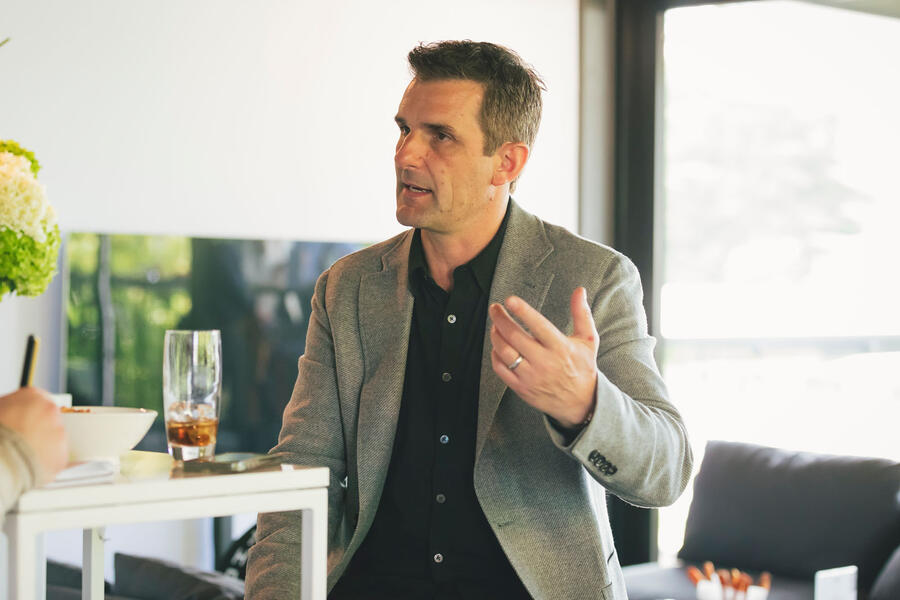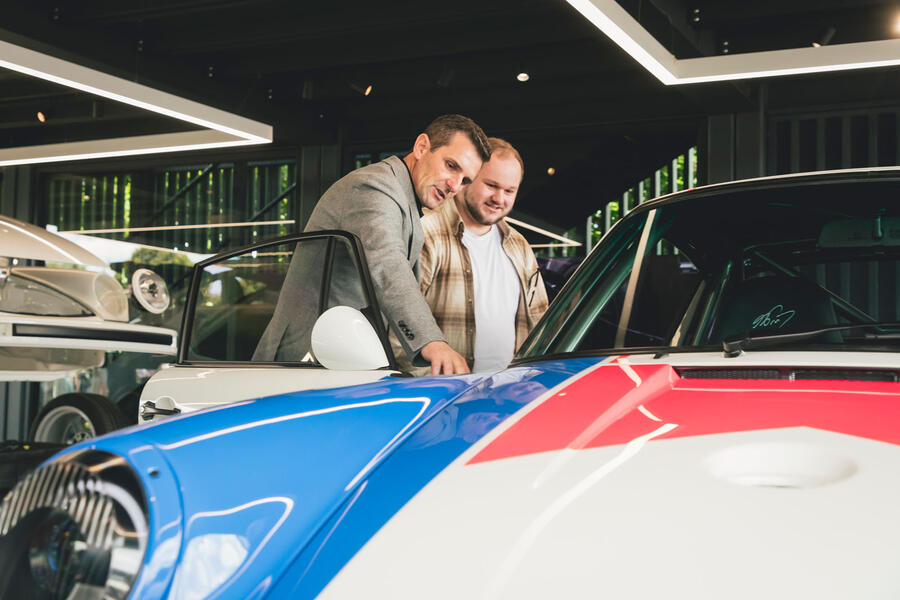British firm Lanzante’s take on the Porsche 911 is unique – but its creation was more a happy accident
Porsche 911 restomods have become something of a cliché, with new firms popping up almost weekly with the promise of analogue thrills and retro-modern looks.Â
But Lanzante – the British firm known for maintaining many of the world’s McLaren F1s, as well as making race cars road legal – has produced one with a genuine difference.
Rather than upgrade the contemporary flat six, as is par for the course, Lanzante opted to retrofit a 911 with a genuine Formula 1 V6 from McLaren’s back catalogue.
Developed by Porsche and named the TAG after the team's contemporary sponsor, the turbocharged 1.5-litre powerplant is rumoured to have put out more than 1000bhp in qualifying trim.Â
It thrust McLarens to three consecutive drivers’ championships between 1984 and 1986 – at which point it was succeeded by the legendary Honda unit that delivered Ayrton Senna three titles.
Retrofitting such a potent engine into a classic is a tantalising proposition but, as Dean Lanzante told Autocar at the Goodwood Festival of Speed, it was never the original plan.
He simply wanted to purchase McLaren’s original TAG test mule, a 930-generation Porsche 911 Turbo, from the firm’s racing arm. Team boss Zak Brown politely declined the request, but Lanzante was undeterred.Â

“They had a load of engines. These engines had stood since the ’80s, but they were all crated up,†he says.
Sensing an opportunity, he began to assemble a business case for building a small run of road cars referencing that original mule. Cosworth was chosen to modify the engines for reliability and tractability on the road, but the costs quickly began to mount.
Lanzante explains: “We realised that doing two or three cars would be hugely expensive. Really, we needed to do more – a batch. Initially we thought to do as many as [the engine’s] race wins, 25, but there weren’t enough engines. We fixed on 11 cars, one for each driver for each year: the reason for the odd number was in 1985 they had three drivers – John Watson stood in for Niki Lauda.â€
He was “adamant†that the standard cars had to appear as the mule would have in its day, so he forced clients to pick from Porsche colours and materials. “It wasn’t a ‘Pimp My Ride’ car,†Lanzante jokes, noting that the TAG Turbo 911 has a sunroof, electric mirrors and its original steering wheel.
But one particularly important customer – the owner of Alain Prost’s 1985 championship-winning McLaren MP4/2 – wanted more punch than the 503bhp afforded by the ‘regular’ TAG 911.
“We’ve had a lot of criticism,†he says, but “they [McLaren] ran four bars of boost. We run three. We’ve lowered the compression ratio because we run regular fuel and they were running race fuelâ€. It’s a “trade-off†between power and usability, Lanzante says.
Such is this client’s clout that Lanzante expanded its plans to comprise three ‘Championship’ cars celebrating each title won by TAG-engined McLarens. These are boosted to 625bhp and shed 400kg of weight, bringing them down to 920kg (dry).
They will be painted in reference to the helmet liveries of the drivers who won each championship: the first in Alain Prost’s French flag, and the other two in Niki Lauda’s Austria-Marlboro strip.
Expanding on the Championship edition’s new details, Lanzante says: “The seatbelts have Hugo Boss written on. The steering wheel is made by Personal and trimmed in suede – not Alcantara. It’s all period-correct. The gearlever is the same design as in the F1 car, and the wheels were made by Dymag from the original drawings scaled up, so the spoke pattern matches the F1 wheel.â€Â

Traction control is included as a concession to drivability – â€a sort of safety measure†– but “this is a little bit more brutal,†Lanzante says.
Although the three Championship cars were not originally in the plan, Lanzante is firm in his commitment to building just 14 TAG Turbos in total. He is of course limited by the number of engines available – and has purchased one extra as an “insurance policy for everybody†– but would not press the engine back into production.
Lanzante says: “You could remake that engine, remake the castings and all of that. But a lot of people who’ve bought this, it’s not about lap times. This isn’t that.
“This is: you are driving a beautiful car, and you’re driving a car that a Formula 1 driver has campaigned in a Formula 1 race week. That’s the special thing. That is what most of the people have bought this for. How many people would be able to buy a [McLaren] MP4? There’s a few, but how many people would be able to get in and drive it? Very few.
“I could remake it, but it wouldn’t have the same soul to it. It’s the fact that it’s an original engine. It’s that we borrowed the original car from McLaren and scanned it. If I knocked out a load more of these, there’d be no point.â€
The TAG 911 was “the hardest†project ever undertaken by Lanzante, he says.
So how to follow it up? “The truth is, I don’t know.â€
Lanzante elaborates: “A lot of people have said: ‘You’ve done a Porsche project. Are you going to do another?’ It’s a saturated market. I want to lead with something new, not just follow what everybody else is doing. I’m not knocking anyone: I don’t want to be just another. I want to stand on my own.â€
But days after our chat, Lanzante’s team makes a big statement.
One of the other stars of the Festival of Speed was the Red Bull RB17, an Adrian Newey-designed track weapon packing an 1184bhp hybrid V10.

Red Bull Technology bosses had already hinted at the potential for owners to make the hypercar road legal, with CEO Christian Horner telling Autocar: “I'm sure there are several conversion houses that are capable of doing that.â€
It proves that Lanzante gets there first. “Work will start immediately to develop the necessary upgrades to allow it to be driven on public roads,†its statement reads.Â
I, for one, can’t wait to see the finished product.




